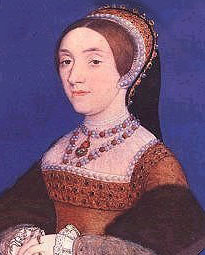Today’s post is a very interesting guest article by Alisa Libby author of The King’s Rose, the story of Catherine Howard’s rise and fall told in Catherine’s own words. Read my interview with Alisa here.
I think we have all asked ourselves how Catherine Howard could have been so reckless in her dealings with other men especially when she knew of the fate of her cousin, Anne Boleyn. One would imagine that Catherine would have been extra cautious not to anger her royal husband in any way. Instead, Catherine fell in love with Thomas Culpeper and engaged in a treasonous love affair with him or did she?
In Alisa’s article she examines this very question. Was Catherine Howard guilty? What do you think?
Did she or Didn’t she? By Alisa Libby
There is a giddy, gossipy element to Catherine Howard’s story. I can imagine what her ladies whispered, clustered in the shadowed corners of the royal chamber: Was Catherine not the pure and innocent “rose without thorn” with whom King Henry had fallen in love? Had she had dalliances with men prior to their marriage? And worse—was she engaging in such indiscretions right under the king’s nose?
King Henry was notoriously particular about his brides. How did the king, nearly 50, wind up with this pretty, vivacious, and ill-prepared teenage girl as his royal consort? He had already had a colorful marital career (the first three ending in divorce, execution, and death in childbed) when he shipped in the German princess Anne of Cleves to become his fourth bride. But Henry was doomed to be disappointed in Anne—she wasn’t as pretty as her portrait, nor as young. For a powerful king trying desperately to cling to his own youth and produce another male heir for his throne, he held these traits at a premium.
So Henry’s eye strayed from his newest wife, lingering on the ladies at court arrayed before him. Who was this pretty, petite girl, twirling across the dance floor at Hampton Court? Catherine Howard was new to court, installed as a lady in waiting in the fall before the new queen’s arrival. By the following spring, the king’s displeasure for his new bride was well known, and Catherine was being showered with royal gifts. By the summer of 1540, the king had procured his divorce and married Catherine Howard.
It’s a Tudor-style Cinderella story. Once a junior lady in the queen’s household, now the royal chambers were her own. The queen’s ladies were now her ladies. Her royal husband spoiled his young bride with opulent gowns, royal jewels, and lavish banquets. Catherine reveled in the ongoing party—no doubt she would soon be crowned Queen of England. She was young, and would certainly produce an heir to the throne. Never mind that she hadn’t been at court for a full year, and likely didn’t grasp all of the political maneuverings happening beneath the surface. Never mind that she was only a teenager, who had no notion of how to handle an aging and dangerously moody king. Never mind that she may not have been a virgin on her wedding night, as King Henry had believed. Never mind that she may have been in love with someone else.
Catherine appears to have enjoyed those early months of her royal marriage, with all of the celebrations entailed. But she too learned about the king’s more mercurial nature; his ill-health, his temper, his mood swings, and the terrifying range of his power. Here was a man who could order an execution of one of his own servants, only to speak of the act with regret in later years. He could change the law to suit his own needs. Henry was treated like a god upon earth, and all were subject to his whims.
And what about Catherine? Though Henry’s renewed vigor faded after their first few months of marriage, he still appeared pleased with his young bride, confident that she would bear him children. In the fall of 1541, Henry was informed of rumors regarding the queen’s behavior prior to their marriage. Though he asked for the matter to be investigated, he did not respond with his customary paranoia. He believed that she was pure and innocent, his “rose without thorn.”
So, what wild antics was young Catherine up to in her days before entering the royal bedchamber? Well, that depends on which biographies and histories you read, but I can share my consensus: Catherine likely had a flirtation with her music tutor, Henry Manox, and later a more serious relationship with Francis Dereham. That autumn, when Queen Catherine’s innocence was in doubt, the ladies who had lived with Catherine in these earlier years at Lambeth (her step-grandmother’s residence) recalled this relationship: that she and Dereham called each other husband and wife and, so it seems, acted the part as well. It’s possible that these ladies were lying, for whatever unknown motivation. But it’s likely that there was something to the overheard “puffing and blowing” (as one of Catherine’s former bedmates reported). Catherine’s life at Lambeth was certainly lacking in education and supervision—unless you count the supervision of the other women in the bedchamber, some of whom were inviting young men to their beds, as well. While not uncommon for the time period, these were unusual circumstances for a girl who would one day be the king’s bride. In those early days at Lambeth, no one dreamed of such a turn of events; least of all, Catherine, herself.
It was during this investigation of Catherine’s pre-marital life that another young man was mentioned in connection to Catherine: Thomas Culpeper, one of the grooms of the king’s chamber. According to rumor, Catherine’s affections had shifted to Culpeper, either before or during her marriage to the king. At least one source I read maintained that it was nothing more than flirtation, but most others agree that Catherine had an affair with Thomas. It’s impossible to know what happened behind closed doors, but Catherine’s ladies certainly cast every suspicion upon her when questioned, saying that she looked upon Culpeper as if she were in love with him. Her closest servant, Joan Bulmer, said that Catherine urged her to arrange secret meetings with Thomas. Though Thomas himself did not admit to having consummated their affair, he claimed that the queen was “languishing and dying of love” for him, that she insisted on meeting with him, and that they “intended to do ill” together. This intention was enough to mean death for both of them—the thought alone was tantamount to treason.
What was Catherine thinking, having an affair while she was married to such a powerful king? Henry had already executed his second wife—Anne Boleyn—on charges of adultery. Catherine should have known that any secret dalliance would have been discovered, and that the results would be dire. A love letter addressed to Thomas and signed “Kathryn” does exist; it appears that she was in love with him, though that doesn’t excuse her recklessness. Perhaps she was stupid and spoiled and selfish. Perhaps she was young and lonely and desperate to see her beloved. When she became queen, she could not stop herself from acting on her whims: the banquets and entertainments she planned are testament to her desire for pleasure. She may have received every material possession she desired, but her heart craved more. While her actions may not make her admirable, they do make her human.
Despite the king’s initial belief in Catherine’s innocence, the evidence against her was simply too damning to ignore. The king may have shown weakness in marrying Catherine, but he would not show it in condemning her. On February 13, 1542, two months after the executions of both Francis Dereham and Thomas Culpeper, Catherine met her own fate on the Tower Green. Her brief time as King Henry’s bride made very little impact on history. But the experience left its mark upon Henry: the surge of vibrant energy he had experienced upon first marrying Catherine had vanished, and would not return. The king was an old man; he could no longer deny it, even to himself.
To see Catherine’s letter to Thomas, visit http://www.nationalarchives.gov.uk/museum/additional_image_types.asp?item_id=13&image_id=17&extra_image_type_id=1
To learn more about The King’s Rose, visit http://www.alisalibby.com/content.php?page=kingsrose&n=3&b=2&f=2
On my website www.alisalibby.com you can also find additional information about Catherine Howard, a list of resources, and a journal of my research trip to England to visit her old haunts (literally).
To win a copy of Alisa Libby’s book see full entry details here.

















Poor Catherine. I don’t think she was spoiled, stupid or selfish. She was a teenager who failed to see the consequences to her actions. Whether she had an affair or not, she was suspicious enough, but had no friend or ally to help her realize that.
Catherine Howard always seemed a sad case–very little love and protection from her parents, supervised by an old woman who really did nothing to help the wards who lived with her, married to what must have been an “old man” and tempted by a young man with whom she fell in love–what teenager would have known how to handle such things!
Thanks!
So sad what happened to her. She was a slightly naive teenager. She obviously knew what happened to Anne B (with all the false accusations) but didn’t think she would get caught.
I agre with you Theresa Bruno.
I don’t think Katherine was stupid at all, I do however believe that if you look at her actions, they reinforce the view that Catherine was only 18 or 19 when she died. Such recklessness definitely can be attributed to the implustivity of youth. It also probably a product of her childhood, she was poor country girl who was never really paid much attention by anyone. (why also explains why she was preyed upon by Mannox and her relationship with Derham) So when she came to court, all the glitz, glamour and attention probably hardly seemed real too her.
I also think Catherine is a sad case. So young to lose her life. I don’t believe she really knew what she was getting herself into and I also believe there is much more to this story than we will ever know. I think she did know better than to have an affair with Thomas Culpeper however, she may have been infatuated with him since Henry was much older and did not spend much time with her. I don’t think, being the Queen of England, she would have had the privacy to handle such an affair with so many eyes always on her. It is a shame that her life, before she knew the King, would have to condemn her when Henry had so many lovers in his past. What a double standard! I realize this was acceptable in this time period but for so many people to lose their lives over having sex is so sad. I think being such a young age, her upbringing or lack thereof, and not being brought up as most royals are, all played a big part in her downfall. The part of Queen of England was just too big for her. I don’t think it was her fault but blame it on immaturity. I blame Henry more that Catherine. He should have known better!!
Yes, Catherine was guilty, there is absolutely no doubt of this, since her lovers confessed. Catherine was a pawn used by her uncle the Duke of Norfolk to continue his influence as one of the leading members of the king’s council. The King was fairly old by Tudor standards, over weight and probably suffering from what today we call erectile dysfunction. The queen young but not innocent paid for her uncle’s ambition.